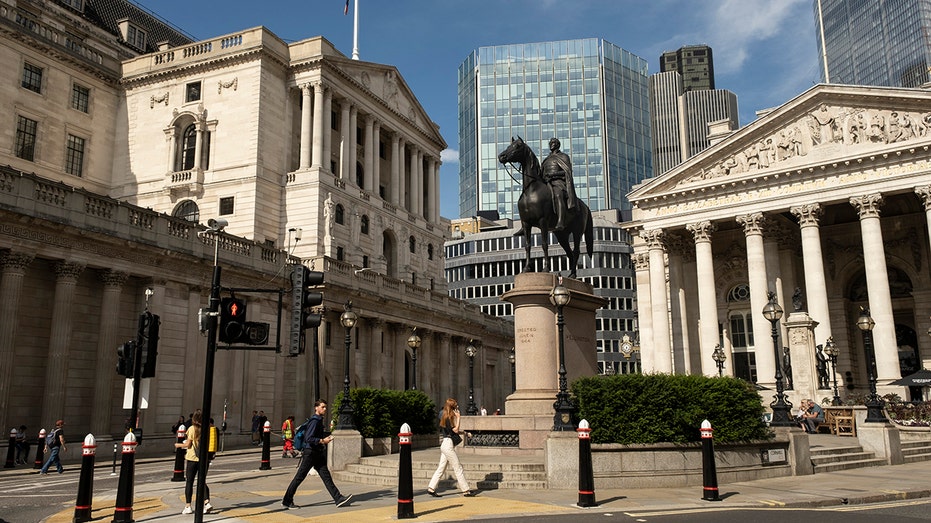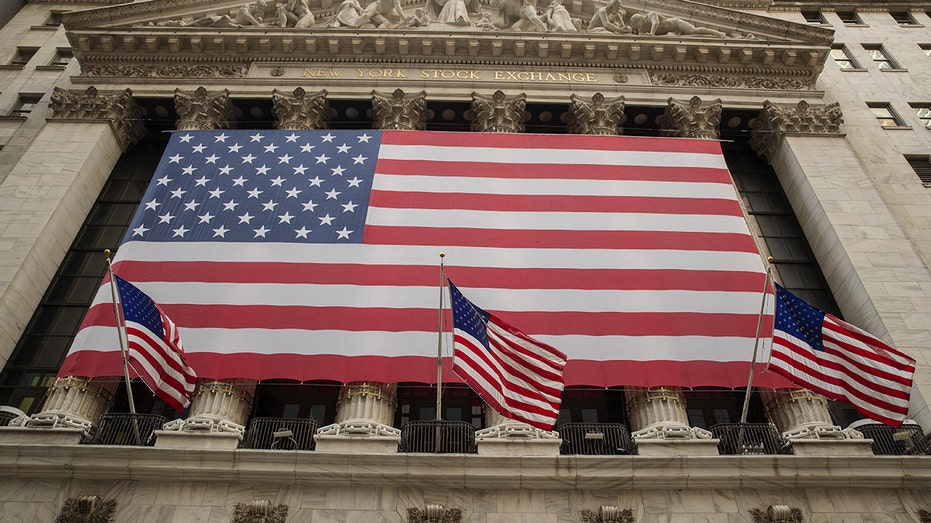Growing CEO pay gap gives New York an extra edge over London
Thanks largely to big stock awards, CEOs of U.S.-listed companies tend to make several times more than those in the U.K.
Even America's top CEOs 'don't really know' what tools can mitigate, regulate AI: Will Rinehart
Center for Growth and Opportunity senior research fellow Will Rinehart argues he's 'most concerned' about cyber security and hacking related to artificial intelligence.
As New York vies with London for high-profile listings, one key advantage is often left unsaid.
Companies frequently tout the deep pools of capital, expert analysts and investors, and potentially higher valuations that come with a U.S. stock-market presence.
There is another issue that executives appear less eager to talk about: They can get paid a whole lot more across the Atlantic, where corporate bosses can easily make triple what their U.K. counterparts earn.

FILE: The sun sets on the skyline of midtown Manhattan, the Empire State Building and Hudson Yards in New York City on December 17, 2022, as seen from Jersey City, New Jersey. (Gary Hershorn/Getty Images / Getty Images)
In 2021, the typical S&P 500 chief executive officer made $14.5 million in total compensation, including salary, bonuses and stock awards, according to Equilar, which tracks compensation data. The median total the same year for those in Britain’s FTSE 100 was 3.6 million pounds, or about $4.5 million, Deloitte UK data show.
BAYER’S NEW AMERICAN CEO TREADS SOFTLY AS HE TAKES ON WOUNDED PHARMA GIANT
"Pay is a factor—one of many—when companies in general think about moving to the U.S.," said Tessa Bamford, a consultant at Spencer Stuart. She said being able to offer higher compensation gave companies access to a wider pool of talent.
The issue has come to the fore recently as a spate of companies have gravitated toward New York, including ARM Holdings PLC. The British chip designer, listed in London until its 2016 buyout by SoftBank Group Corp., is preparing for a blockbuster New York listing.

London financial district outside the Royal Exchange near the Bank of England with the statue of the Duke of Wellington July 2021 in London, United Kingdom. (Mike Kemp/In Pictures via Getty Images / Getty Images)
British officials are looking at easing regulations to lure companies and top CEOs to the U.K., amid broader concern that London maintains its standing as a top financial center. A study published March 30 by the City of London Corp. ranked the city and New York joint equal, whereas last year it had given London a slight advantage.
The gulf in compensation has widened in recent years. Booming U.S. stock markets, dominated by tech and other growth-focused companies, together with rising corporate profits, have enabled American companies to pay their leaders handsomely. London’s stock market, dominated by more traditional companies such as banks, drugmakers and miners, hasn’t risen nearly as much.
From 2015 through 2021, the median compensation for S&P 500 corporate chiefs rose 34%, while for FTSE 100 CEOs it fell 13%.
BILLIONAIRE LANDLORD KEN GRIFFIN PUSHES NYC MAYOR TO FIX CRIME
"There’s always been a gap. The gap is getting bigger," said Mitul Shah, head of the executive-compensation advisory unit at Deloitte.
There are several forces—financial, regulatory and cultural—driving the trans-Atlantic divide, which also applies to other key positions such as chief financial officers and board chairs.
High executive pay doesn’t stir the kind of backlash among U.S. investors and the American public that it does in the U.K., said Ms. Bamford of Spencer Stuart. She is a former board member at Ferguson PLC, the plumbing- and heating-supply company that last year made New York its primary trading venue instead of London.
Reflecting the greater sensitivity, shareholders in British companies have more say on what executives earn. A 2013 U.K. law requires shareholder approval of executive-compensation packages. In the U.S., companies are required only to disclose compensation packages but aren’t forced to win a vote, Deloitte says.
The issue is less legal differences, though, than it is about contrasting investor attitudes and corporate-governance standards, lawyers say. That means companies with a sole or main listing in the U.S. can take a different approach on pay even if they don’t physically relocate their key offices or top leaders.

United States flags fly outside of the New York Stock Exchange (NYSE). List at the NYSE can mean huge rewards for CEOs New York, U.S., March 18, 2020. REUTERS/Lucas Jackson (REUTERS/Lucas Jackson / Reuters Photos)
Compensation structures are also different. Chief executives in the two countries earn roughly the same in salaries and bonuses but vastly different sums in stock awards, said Deloitte’s Mr. Shah.
U.K. executives typically receive only performance-based stock awards, which are contingent on hitting financial targets, and often paid out only several years later, Mr. Shah said. In the U.S., boards typically hand out both performance-based and guaranteed stock awards, and corporate leaders often get shares more quickly, he said.
CLICK HERE TO GET THE FOX BUSINESS APP
One major investor in U.K. companies said it supports companies that reward CEOs for long-term growth and that also focus on social goals, not just financial ones. "We like to see long-term incentives," rather than ones that encourage short-termist behavior, said Geir Lode, head of global equities at Federated Hermes Ltd.
Others caution that British business could lose out.
"The concern is that the existing remuneration rules in the U.K. start to cause a talent drain," said Oliver Lazenby, a partner at Freshfields Bruckhaus Deringer LLP, a London-based international law firm.
"If you know you can earn in the U.S. a multiple of what you can earn in the U.K. for doing a similar job, and without all the opprobrium that often gets heaped on executives by investors in the U.K., then naturally that becomes a draw factor."




















